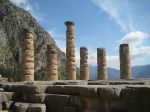While we’re in Athens, we’re going to be taking a day trip to Delphi, which is best known for the Delphic oracle, the most important oracle in the classical Greek world, and a major site for the worship of the god Apollo after he slew the Python, a deity who lived there and protected the navel of the Earth.
Apollo, the Oracle and the Pythia:
Apollo spoke through his oracle: the sibyl or priestess of the oracle at Delphi was known as the Pythia; she had to be an older woman of blameless life chosen from among the peasants of the area. She sat on a tripod seat over an opening in the earth. When Apollo slew Python, its body fell into this fissure, according to legend, and fumes arose from its decomposing body. Intoxicated by the vapors, the sibyl would fall into a trance, allowing Apollo to possess her spirit. In this state she prophesied.
While in a trance the Pythia’s ravings were “translated” by the priests of the temple into elegant hexameters. People consulted the Delphic oracle on everything from important matters of public policy to personal affairs.
The oracle could not be consulted during the winter months, for this was traditionally the time when Apollo would live among the Hyperboreans.Dionysus would inhabit the temple during his absence.
Famous Oracular Statements:
There are more than 500 supposed Oracular statements which have survived from various sources referring to the oracle at Delphi. Here’s one example:
Around the 9th century BC, Lycurgus (the legendary lawgiver of Sparta) went to the oracle to ask for guidance. The oracle told him that his prayers had been heard and that the state which observed the laws of Lycurgus would become the most famous in the world. With such an endorsement, Lycurgus went to the leading men of Sparta and enlisted their support. Seeking further assistance she also told him:
- There are two roads, most distant from each other: the one leading to the honorable house of freedom, the other the house of slavery, which mortals must shun. It is possible to travel the one through manliness and lovely accord; so lead your people to this path. The other they reach through hateful strife and cowardly destruction; so shun it most of all.
As a result Lycurgus built a constitution for the Spartans that combined features of a monarchy with two kings, of a land-owning aristocracy and a democracy. The oracle further told him:
- Love of money and nothing else will ruin Sparta.
As a result Lycurgus decreed that no silver money was allowed in Sparta, creating a cumbersome iron currency instead. The oracle was proved correct. The enslavement of the helots (the unfree population of Sparta) and the gold and silver its soldiers sent home after the Peloponnesian War were to prove to be Sparta’s undoing.
Check back tomorrow for my favorite tale from the Delphic oracle!
Sources: http://en.wikipedia.org/wiki/Delphi; http://en.wikipedia.org/wiki/Famous_Oracular_Statements_from_Delphi.




